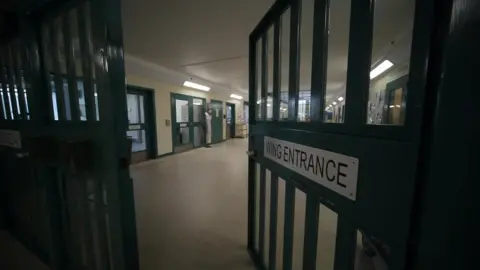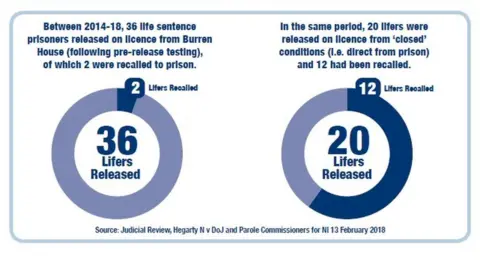NI prisons report: 'Victims should be told of prisoner outings'
 BBC
BBCVictims should be notified before serving prisoners are allowed out of jail for activities like sport or exercise, a report has said.
The Criminal Justice Inspection (CJI) Northern Ireland report was ordered last year after prison staff took five convicted killers on a hiking trip.
CJI said external activity rules must be better explained and documented.
It also said victims who register for information updates should be contacted before inmates take part in outings.
The Prisoner Release Victim Information Scheme (PRVIS) was established in 2003 but participation levels have been low.
'Walking clubs'
Overall however, the report found that most temporary release schemes in Northern Ireland prisons were "functioning well".
Director general of the Northern Ireland Prison Service (NIPS) Ronnie Armour welcomed the report and its findings.
"While legislation provides that the more serious offenders can be detained indefinitely until they are assessed as safe to release, every prisoner in Northern Ireland can expect to be released at some stage," the report stated.
"Preparation for release must therefore include efforts to reduce the risks they pose."
The report listed some examples of outings in the prisons' external activity schemes, including Belfast City Marathon, over-50s walking clubs and work placements at theatres and gardening projects.
In addition to the external activity schemes, CJI examined home leave, Christmas home leave, temporary release (both accompanied and unaccompanied), compassionate temporary release (to attend a family funeral or visit a critically ill relative), town visits and resettlement leave.
It said pre-release testing in its various forms was an essential part of prisoners' rehabilitation as it helps probation services to make decisions on when it was safe for inmates to return to society.
"The main concern that arose in this inspection was external activity schemes," said CJI's chief inspector, Brendan McGuigan.
He said there were examples whereby prisoners had been permitted temporary absence from prison, despite not meeting Northern Ireland Prison Service (NIPS) criteria.

"In one case, the NIPS Prisoner Record and Information System (PRISM), which was designed to incorporate the checks and balances necessary for proper security, was altered so that a prisoner could participate in an external activity scheme," the CJI report said.
"Subsequent legal advice clarified nothing wrong had been done, though the NIPS acknowledged it was a mistake not to have consulted another government agency which had a potential interest in the case."
The chief inspector said NIPS "needs to better explain, to its own staff, partner agencies, victims and prisoners, what it is trying to achieve with external activity schemes".
NIPS commissioned CJI to examine pre-release arrangements last year after two controversies involving serving prisoners on temporary release schemes.
In September 2018, five convicted killers hiked up Northern Ireland's highest mountain, Slieve Donard, before having tea in the nearby seaside town of Newcastle.

Four of the inmates were serving lengthy sentences for killing women, and the group of five was accompanied by two prison guards.
The following month, a prisoner absconded while subject to pre-release testing.
However, the CJI report points to figures which suggested that prisoners who took part in pre-release testing programmes were less likely to end up back in jail for re-offending.
Over a four-year period from 2014 to 2018, 20 life-sentenced prisoners were released from a closed prison setting and more than half (12) of them were recalled to jail.
By contrast, of the 36 life-sentenced prisoners who were released from the "more relaxed regime" of Burren House in Belfast, only two ended up back in jail.
 Criminal Justice Inspection (CJI)
Criminal Justice Inspection (CJI)In respect of home leave, the report said 80% of all applications from prisoners with a Protestant community background were approved last year, while only 68% were approved in cases where the applicant was from a Catholic background.
"This is consistent with the findings of other inspections that showed poorer outcomes for Catholic prisoners in several respects, including Home Leave applications." the CJI stated.
"The NIPS had commissioned a piece of research into the reasons for outcomes for Catholic prisoners and has stated an intention to act on the basis of its' findings."
The report makes two strategic recommendations and four operational recommendations to improve pre-release testing arrangements.
Among them is a call to promote the Prisoner Release Victim Information Scheme (PRVIS) to encourage more victims to sign up.
Only 275 victims were registered in February this year and the authors said many people "assumed they were registered when they actually were not".
PRVIS was designed as an "opt-in" as opposed to an automatic update system because some traumatised victims do not wish to have any further reminders of the perpetrator.
CJI said some victims were also "deterred by the fact that their representations about the prisoner could not be kept confidential".
Other recommendations include exploring the possibility of electronic monitoring of prisoners on temporary release.
The CJI also called on the prison authorities to "review the totality" of its pre-release testing and home leave schemes to ensure consistency and best practice.